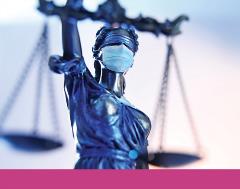Addressing the Ethical Dimension of Care During the Pandemic
 This article is a shortened version of content published in the latest issue of AGD Impact. Read the full article.
This article is a shortened version of content published in the latest issue of AGD Impact. Read the full article.As we reach a critical point in the pandemic and continue to evaluate a barrage of daily new information, it is important to consider the ethical landscape of dental practice. Of significant concern are justice, equity and access to care.
Vaccination Status
As public fear of going to the dentist subsides, dental health providers are faced with additional, and some novel, ethical dilemmas. One of these is the vaccination status of the dental team and patients. Dentists play an active role in preventing transmission and spread of the virus in accordance with beneficence and the obligation to use skills and knowledge for the improvement of the dental health of the public.
Regarding the dental team, while there is individual freedom to choose whether or not to receive the vaccine, the Centers for Disease Control and Prevention (CDC) recommends vaccination of healthcare providers because of increased risk of contracting COVID-19 while caring for patients who might be infected. Current evidence suggests that full vaccination reduces asymptomatic infection and potential virus transmission.
Thus, protecting ourselves may be considered an integral component of our professional and ethical duty to cause no harm. Other potential benefits of vaccination of healthcare teams include keeping essential workers healthy, reducing absences, and improving productivity and morale. The principle of beneficence underpins the dentist’s duty to create and maintain a workplace environment that is supportive and collaborative for the benefit of patient care.
When it comes to patients, their vaccination status may not always be the same. And, while evidence is still unclear, the CDC has stated that the risk of fully vaccinated people contracting and transmitting the virus cannot be completely eliminated as long as community transmission persists. This is of special concern when considering pediatric patients who are not yet receiving vaccinations, patients unable to get vaccinated for medical reasons, and immunocompromised patients for whom there is limited data on vaccine protection. As such, even if fully vaccinated, we have an ethical duty to protect ourselves and those at risk by adhering to recommended infection prevention and control practices specific to delivery of care in dental settings. These include donning appropriate personal protective equipment, adopting teledentistry and patient triage before appointments, monitoring self and staff for signs and symptoms of disease, implementing work practice and administrative controls, and devising protocols for response to virus exposure.
At the very least, under current guidelines, employers should encourage employees to get vaccinated rather than making it a requirement. Best practices for workplace vaccinations include offering supportive policies such as flexible, nonpunitive sick leave options for employees suffering from side effects after vaccination, allowing employees time to become confident about receiving the vaccine, and reaching out to respected organizations or individuals to help build confidence in the vaccine. Dentists must devise protocols to maintain confidentiality and to protect patients and staff who cannot be vaccinated due to medical conditions or those who refuse vaccination.
The pandemic has impacted our personal, economic and professional lives, but it has also afforded us an opportunity for reflection, adaptation and innovation. Ethics concerns brought forth by the pandemic involve the individual dentist, patients, staff, the community and the dental profession. Concerns must include the need for an increased focus on the most vulnerable, taking measures to minimize risk to patients and the dental team, and recognizing that in times of crisis, ethical obligation to the public may take precedence over ethical obligations to individual patients.
As vaccines have become more available and accepted, we must continue to address new ethics challenges while not losing focus on the most important goal, which is quality of patient care.
Odette Aguirre, DDS, MS, MPH, is a visiting clinical assistant professor in the department of Biomedical Sciences and Comprehensive Care at the Indiana University School of Dentistry. She is currently the president of the American Society for Dental Ethics. To comment on this article, email impact@agd.org.
